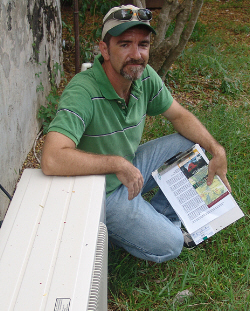
Board member Brian Daley led media around the 16-acre facility Monday showing off the things – big and small – that have allowed the garden to slash approximately $6,675 from its annual power costs, reducing electrical usage by about a third.
The garden was facing power bills that were "outrageous," Daley said. Percy Radclyffe, supervisor of engineering at the Energy Office, said when he saw the bills he assumed a mistake had been made.
"It couldn’t be right," he said.
But it was.
So the garden’s board of governors embarked on a project to change things.
"We’re a garden, we’re supposed to be green anyway," Daley said.
The project cost roughly $20,000, with about $14,000 of that coming from an Energy Office discretionary grant for retrofitting buildings.
They did all the little things, replacing light switches with motion sensors and putting in compact fluorescent lights in place of incandescent bulbs. But they also focused on four bigger projects that offered the chance for real savings.
The first and probably most important, Daley said, was overhauling the electrical panel in the Great Hall, an old building that is used for community events year round. It posed the greatest challenges, Daley said.
"Everything here is done by volunteers. Our whole electrical system was cobbled together by volunteers over decades," he said.
Energy auditors tried to track the system to see where electricity was being lost to short circuits and open grounds, but it was hard to tell where anything went. So the first stage was to overhaul the antiquated electrical panel. It wasn’t the most glamorous part of the project, Daley said, but it has already paid off in savings and now engineers can track each line and plug any "leaks" in the system.
They also disconnected or got rid of old appliances – air conditioners, refrigerators and others – that had been donated to the gardens over the years and replaced them with energy-efficient products.
Often when people remodel or get a new appliance they donate their old one to a charity, according to Radclyffe. Such an act is well-intentioned, he said, but in the long run that’s not really helping the organization.
"Go down and buy them a new efficient, Energy Star-compliant appliance," he said. "Otherwise you put them in a position where they’re paying more for electricity."
The Great Hall also had a new solar water heating system installed by Solar Solutions. The system operates so efficiently that volunteers have said the water is too hot. A valve has to be monitored seasonally to make sure the right mix of hot and cold water comes through the system.
But the energy to heat that water comes from the sun, Daley pointed out, and that’s free.
Two split air-conditioning units were also installed, one in the library and the other in the herbarium. The library is not always in use, but because it contains many historical and one-of-a-kind books, the environment has to be carefully maintained to keep them from falling apart. Similarly, the herbarium – which Daley called the best non-living collection of Caribbean plants anywhere – contains thousands of samples harvested from throughout the islands, some of them decades old. Too much heat or moisture, and that collection would rapidly fall apart.
Both buildings had been air conditioned by old window units that sucked power and made lots of noise. The new split-systems have the compressor motor outside, which reduces both heat and noise.
Because of these and the many little changes, the garden’s power bill for May of this year was 63 percent of the bill for the same month in 2006. The herbarium air conditioner alone saves the garden more than $2,000 a year, and the rest of the improvements add another roughly $4,500 in savings. Radclyffe said the project will have paid for itself in two years.
And that’s just the beginning. He predicted that the next stage, tracking the leaks in the wiring and outlets that is possible now with the overhauled electrical system, in another year the gardens will have cut its bill in half.
Joseph Daniel, the energy operations coordinator for the V.I. Energy Office, said such savings, good in and of themselves, will inspire businesses to take similar steps.
"Tell a businessman he can invest and be paid back in two years, and he’ll smile," Daniel said. "It’s a very powerful teaching tool."
And once the grant has paid for itself in energy savings, the equipment will still be there, keeping power bills lower.
"It will keep paying for the next however many years," he said.





